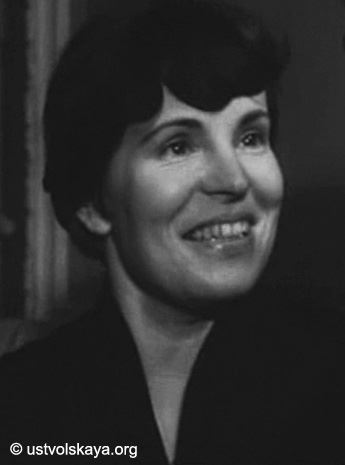
Galina Ivanovna Ustvolskaya (1919 - 2006)
Galina Ustvolskaya was born in Petrograd in 1919, educated in Leningrad, and died in St Petersburg in 2006. The name changes of her native city reflect some of the tumultuous political and social upheavals in Russian history during the course of the twentieth century: revolution, Stalinism, glasnot, to mention but three. It was amid such turbulence that Ustvolskaya lived and composed. Much has been written about her professional and personal relationship with Shostakovich, but she took grave exception to the fact that she was always defined in terms of her gender and by whom she was taught—Shostakovich. In 1994 she declared that not once ‘during my studies at the Conservatoire, which I spent in his class, was Shostakovich’s music close to me. Nor was his personality’. Even at the age of 80 she complained that her music was still being compared to Shostakovich’s rather than being judged on its own terms. Ustvolskaya believed that she was patronised as a woman composer, with the implication that in some ways she was perceived as a lesser artist. Drawing comparisons between her own creative approach and that of her fellow Russian composers, she acidly remarked that the men were never defined solely in terms of their sex and who their teachers were. To lend force to her argument, she said how unlikely it is that one would come across an article beginning ‘Rodion Shchedrin is a male composer and pupil of Yuri Shaporin…’
Words like ‘reclusive’ and ‘uncompromising’ are regularly used in connection with Ustvolskaya. She also had a reputation for being a ‘religious-ecstatic’ composer. Many of her purely instrumental works, for instance, have religious titles, but she maintained that her works ‘are not religious in a literary sense, but are filled with a religious spirit’.
Listen to FROM RUSSIA WITH LOVE: RUSSIAN PIANO MUSIC on Spotify


 Grand Piano has gained a reputation for producing high quality recordings of rare keyboard gems. Dedicated to the exploration of undiscovered piano repertoire, the label specialises in complete cycles of piano works by many lesser-known composers, whose output might otherwise have remained unknown and unrecorded.
Grand Piano has gained a reputation for producing high quality recordings of rare keyboard gems. Dedicated to the exploration of undiscovered piano repertoire, the label specialises in complete cycles of piano works by many lesser-known composers, whose output might otherwise have remained unknown and unrecorded.






